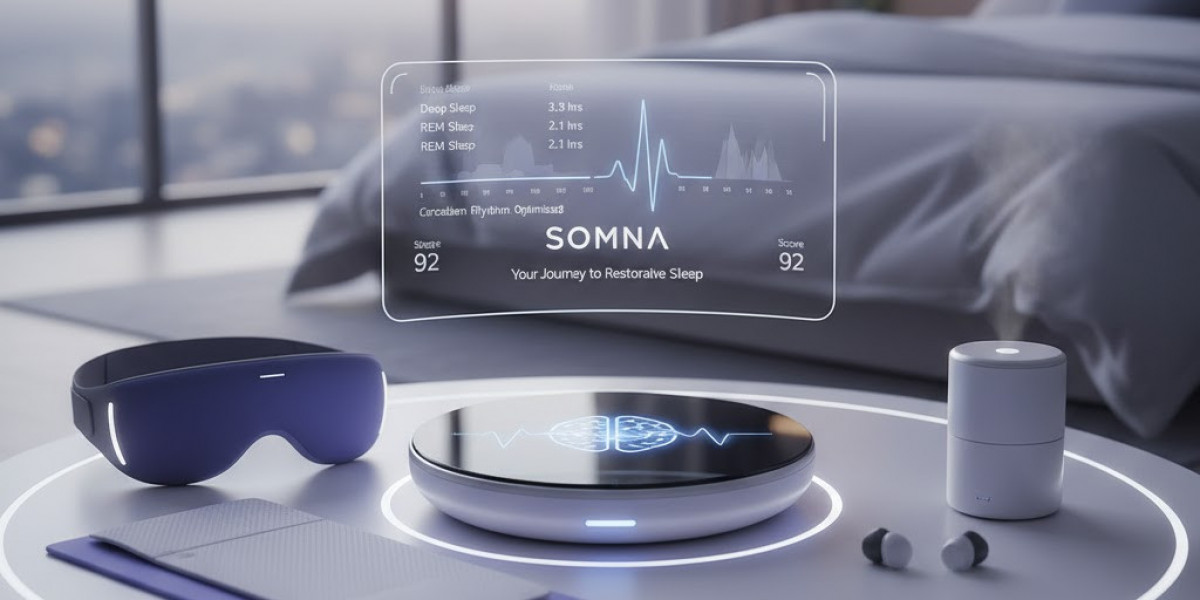The global Sleep Tracking and Optimization Products Market is poised for unprecedented expansion, projected to surge from USD 3,655.8 million in 2025 to USD 20,818.6 million by 2035, registering an impressive CAGR of 19.0%. This rapid growth underscores a worldwide shift toward preventive health, personalized wellness, and AI-driven sleep optimization, as consumers increasingly recognize the essential role of quality sleep in overall health.
Market Overview
Between 2020 and 2025, the market value more than doubles from USD 1,532.0 million to USD 3,655.8 million, marking the first wave of acceleration. This early expansion phase is driven by the widespread adoption of wearable sleep trackers, connected health devices, and sleep monitoring apps. From 2025 to 2030, the market enters a peak growth phase, reaching USD 8,724.0 million, fueled by strong consumer awareness, integration of sleep tracking into healthcare, and the proliferation of AI-powered sleep optimization technologies.
As the market matures from 2030 to 2035, growth remains robust, with revenues climbing to USD 20,818.6 million. While growth stabilizes, the sector transitions into a more sustainable phase of technological refinement and global market penetration.
Why the Sleep Tracking and Optimization Market is Growing
- Rising Awareness of Sleep Health:
Increasing global focus on mental wellness and preventive health drives adoption of intelligent sleep monitoring solutions. - AI Integration & Advanced Sensors:
The fusion of AI algorithms with advanced biometric sensors enables highly accurate, personalized sleep analysis and recommendations. - Health & Wellness Convergence:
Integration of sleep data into fitness and medical platforms empowers users to track, understand, and optimize their sleep behavior seamlessly. - Consumer Demand for Smart Wearables:
Smartwatches and fitness bands equipped with sleep tracking functions dominate the market, especially among younger demographics focused on holistic wellness.
Key Market Statistics
- Market Value (2025): USD 3,655.8 Million
- Forecast Value (2035): USD 20,818.6 Million
- Forecast CAGR (2025–2035): 19.0%
- Leading Type: Wearable Devices (72% Share)
- Top Growth Regions: China, India, Germany
Key Players Transforming the Sleep Technology Landscape
The competitive landscape is marked by both established technology leaders and innovative new entrants investing heavily in R&D and ecosystem integration:
- Established Innovators:
- Apple (Beddit) and Fitbit (part of Google) continue to dominate with AI-enhanced sleep tracking solutions integrated into their broader wellness platforms.
- Garmin, Samsung, and Philips offer clinically reliable sleep tracking tools aimed at professional and consumer markets.
- ResMed pioneers medical-grade sleep monitoring systems with applications in clinical diagnostics.
- Emerging Leaders:
- Oura Health, WHOOP, and Eight Sleep redefine consumer sleep experiences with AI-driven sleep analytics and real-time optimization.
- Anker (Soundcore), Withings, Hatch, and Amazfit are expanding globally with affordable yet advanced sleep tracking wearables and ecosystem-based solutions.
- Asian innovators such as Xiaomi and Huawei are leveraging their strong hardware ecosystems to deliver accessible and connected sleep devices worldwide.
Both established and new manufacturers are forging strategic alliances, scaling production capabilities, and developing new technologies to meet the growing consumer demand for data-driven, personalized sleep solutions.
Key Segments of the Sleep Tracking and Optimization Products Market
1. By Product Type
- Wearable Devices (72% Market Share):
Dominant due to miniaturized sensors, long battery life, and real-time analytics. These devices provide actionable sleep insights and AI-powered recommendations for daily optimization. - Non-Wearable Devices:
Growing demand from households seeking contactless sleep monitoring integrated into smart home systems. - Sleep Tracking Apps:
Expanding rapidly as standalone and companion tools to wearable devices, offering guided sleep coaching and personalized improvement plans. - Others:
Includes specialized smart mattresses, sound-based sleep aids, and environmental monitoring tools.
2. By Application
- Personal Sleep Improvement (85% Share):
The largest segment, driven by consumer interest in wellness technologies for daily sleep optimization and circadian rhythm management. - Medical & Health Monitoring:
Expected to gain momentum as healthcare providers integrate sleep data into telemedicine and preventive care. - Others:
Corporate wellness programs and research-based sleep monitoring solutions contribute to niche growth.
3. By Region
- North America: United States leads with innovation in premium wellness devices and R&D investment.
- Europe: Germany and the U.K. drive adoption through stringent quality standards and health data regulations.
- Asia-Pacific: China and India dominate growth with rapid consumer adoption and smart device accessibility.
- Latin America: Brazil exhibits strong growth potential driven by the wellness movement.
- Middle East & Africa: Emerging markets investing in digital health infrastructure and wellness integration.
Country-Level Market Highlights
- China (CAGR 25.7%) – Global leader in AI sleep innovation and manufacturing scalability.
- India (CAGR 23.8%) – Rapid digital health adoption and vast consumer base for affordable sleep solutions.
- Germany (CAGR 21.9%) – Center for advanced medical-grade sleep technology and compliance innovation.
- Brazil (CAGR 20.0%) – Expanding wellness culture and health technology investments.
- United States (CAGR 18.1%) – Mature market with premium product adoption and innovation leadership.
- United Kingdom (CAGR 16.2%) – Focus on privacy-compliant AI wellness products.
- Japan (CAGR 14.3%) – Pioneer in precision-engineered sleep technology and robotics integration.
Key Market Trends
- AI-Powered Sleep Ecosystems: Integration of multi-sensor devices with AI algorithms for unified sleep monitoring and lifestyle optimization.
- Data Privacy and Regulation: Growing focus on secure sleep data management aligned with global health data standards.
- Holistic Wellness Platforms: Seamless integration of sleep, fitness, and stress management tools within smart health ecosystems.
- Medical-Grade Accuracy: Increasing collaboration between tech firms and healthcare providers for clinical validation.
Strategic Growth Outlook
To accelerate adoption, governments are encouraged to fund sleep AI research, create data privacy frameworks, and integrate sleep health education into public wellness initiatives. Meanwhile, industry bodies can enhance certification standards, foster innovation, and develop sleep AI talent pipelines.
OEMs and suppliers are focusing on scalable AI-enabled device production and sensor development, while investors are channeling capital into emerging startups and infrastructure that support global sleep technology ecosystems.
This Report Now at Just $2000 | Limited-Time Discount Offer! https://www.futuremarketinsights.com/reports/sample/rep-gb-26679
Checkout Now to Access Industry Insights: https://www.futuremarketinsights.com/checkout/26679
About Future Market Insights (FMI)
Future Market Insights, Inc. (ESOMAR certified, recipient of the Stevie Award, and a member of the Greater New York Chamber of Commerce) offers profound insights into the driving factors that are boosting demand in the market. FMI stands as the leading global provider of market intelligence, advisory services, consulting, and events for the Packaging, Food and Beverage, Consumer Technology, Healthcare, Industrial, and Chemicals markets. With a vast team of over 400 analysts worldwide, FMI provides global, regional, and local expertise on diverse domains and industry trends across more than 110 countries.







